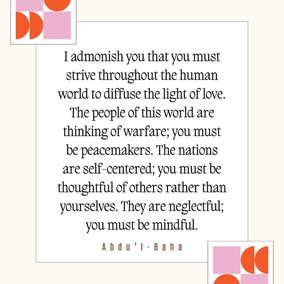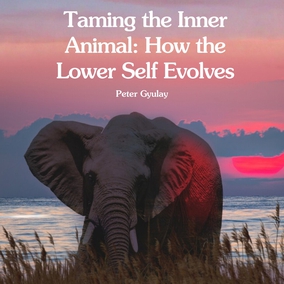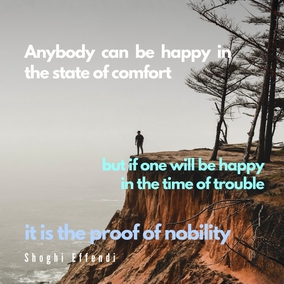The views expressed in our content reflect individual perspectives and do not represent the authoritative views of the Baha'i Faith.
After a month or two of almost continuous coronavirus coverage in the media, I admit that I only occasionally check in with the news these days.
With some former training in the journalism field, I’m troubled by what I see as a lack of balance in the reporting and very little in the way of broader perspectives. Thankfully though, the Baha’i writings offer a larger canvas that I feel can help us navigate through these trying times, and perhaps give us hope.
A book titled “Call to the Nations” by Shoghi Effendi, the Guardian of the Baha’i Faith, has particularly helped me. The central theme of this work revolves around humanity’s painful ordeals in the short term, leading to an ultimately brighter destiny in the long term. Although he called the immediate future “distressingly dark,” he also described the distant future as “gloriously radiant.”
Humanity, Shoghi Effendi wrote, needs to go through a bleak time to eventually prepare it for a greater, more united, and more spiritually-oriented future. Here’s a powerful passage from “Call to the Nations” that summarizes this idea:
Adversity, prolonged, worldwide, afflictive, allied to chaos and universal destruction, must needs convulse the nations, stir the conscience of the world, disillusion the masses, precipitate a radical change in the very conception of society, and coalesce ultimately the disjointed, the bleeding limbs of mankind into one body, single, organically united, and indivisible. – p. 64.

We clearly see such adversity today in the processes that are “convulsing the nations.” Shoghi Effendi wrote this just before World War II, so one could say that the period of adversity that he refers to has already come and gone – but I believe the world still has a lot of suffering to go through. As a “bigger picture” kind of gal, I personally see the current scare over the pandemic as not just a one-off event. Rather, I see the reaction to it as a spark that has already set off a whole cascade of consequences that will really test humanity and, in the process, impel a necessary soul-searching.
Shoghi Effendi prepared us for these events, though, by basically saying that humanity needs to go through a cleansing or purging process in order to reach new levels of maturity. My reading of his work implies that this needs to happen at a couple of different levels.
In the book noted above, Shoghi Effendi starts with our moral foundation, or lack thereof. He chronicles a host of different societal evils – lawlessness, crime, racial animosity, corruption of the press, and the pursuit of earthly vanities among them – that represent the “outstanding characteristics of a decadent society,” which, he said very directly, must either be reborn or perish. He conveys that what is happening in the world is part of a divinely-ordained process to reorient our priorities:
Mysteriously, slowly, and resistlessly God accomplishes His design, though the sight that meets our eyes in this day be the spectacle of a world hopelessly entangled in its own meshes, utterly careless of the Voice which, for a century, has been calling it to God, and miserably subservient to the siren voices which are attempting to lure it into the vast abyss. – Ibid., p. 15.
In addition to this needed reorientation, Shoghi Effendi cited “the decline of religion as a social force” as one of the primary problems of this age. While decrying religious orthodoxy, he lauded the role of religion as a protection for humanity that, if its light is obscured, will lead to chaos and confusion.
In the next part of the book, he talks about global order – or disorder as the case may be – and reiterates that humanity’s suffering has arisen from our resistance to taking the next necessary, and inevitable, step in our evolution:
Unification of the whole of mankind is the hall-mark of the stage which human society is now approaching,” he writes. “Unity of family, of tribe, of city-state, and nation have been successively attempted and fully established. World unity is the goal towards which a harassed humanity is striving. Nation-building has come to an end. The anarchy inherent in state sovereignty is moving towards a climax. A world, growing to maturity, must abandon this fetish, recognize the oneness and wholeness of human relationships, and establish once for all the machinery that can best incarnate this fundamental principle of its life. – Ibid., pp. 52-53.
It’s important to add that Shoghi Effendi advocated a “sane and intelligent patriotism.” In fact, the Baha’i teachings repeatedly point out that the diversity of national customs and cultures enrich the human experience. But, at a time of growing interdependence, he – and the other central figures of the Baha’i Faith – also called for a wider loyalty to the planet and its peoples.
In part, we remain in the mess we are in because of our attachment to outdated and divisive ways of doing things. However, the Baha’i writings not only explain how we came to this point, but also unveil a vision for the future. This startling vision can give us some hope that it all has greater purpose and meaning. One quote at the end of the book is a little more specific about what we can do in a day-to-day kind of way – however confused and dismal things look, Shoghi Effendi said, we should:
… labor serenely, confidently, and unremittingly to lend our share of assistance, in whichever way circumstances may enable us, to the operation of the forces which … are leading humanity out of the valley of misery and shame to the loftiest summits of power and glory. – Ibid.
This article is adapted from Zárrin Caldwell’s Podcast on The Soul Salons: Exploring our Spiritual Heritage.
















Comments
Sign in or create an account
Continue with Googleor